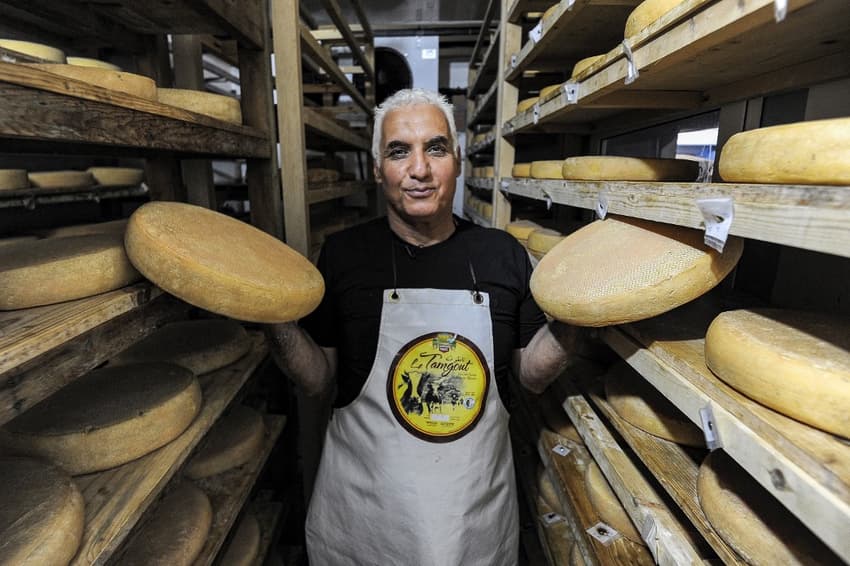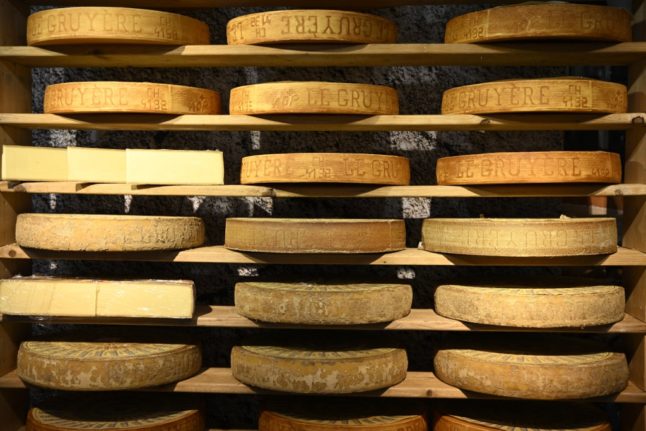Alps to Atlas: How Swiss-inspired cheese arrived in the Algerian mountains

A former Swiss resident has brought what he learned on artisanal cheesemaking in the Alpine nation to the Algerian Atlas mountains.
Sporting a white cap and apron, Rachid Ibersiene bustles around vats at his dairy in Algeria's Atlas Mountains where he has brought the tradition of artisanal cheesemaking back from Switzerland.
"We started with a butane gas bottle and stove," the cheesemonger said, alluding to the growth of his factory since it opened.
In a matter of 15 years, Ibersiene's "Tamgout" cheese - a blend of the Swiss Gruyere and Dutch Gouda styles - has become a source of honour for the north African country.
Both Algerians and foreigners have taken a keen interest in the product, which has a unique taste as it draws on age-old European traditions but is made from Algerian milk.
"We were inspired by Vacherin Fribourgeois, adapting the entire tradition to Algerian milk, which is different from Swiss milk," Ibersiene said, referring to a semi-hard Swiss cheese.
READ ALSO: Why is Switzerland so obsessed with cheese?
"Algerian milk is less uniform and somewhat more organic because the farms are smaller and more diversified. In Switzerland, you don't find farmers with only two or three dairy cows.
"Our cheese has a more nuanced taste," the 57-year-old added, describing it as "typically Algerian".

File photo shows a shelf with Swiss Gruyere cheese. Photo: Tobias SCHWARZ/AFP
Born to a working-class family in Algiers, Ibersiene studied petroleum engineering but struggled to find a job.
After moving to Italy, he tried his luck at filmmaking before relocating again to Switzerland, where he spent 16 years working as a computer consultant.
"That's where the idea of the cheese factory came from," he recalled.
"To relax on weekends, I would go up to the mountain chalets in Gruyere where many cheesemakers are located."
'Source of pride'
In 2003, he moved to the area to learn the basics of Swiss cheese production.
Three years later, he returned home to set up his own dairy factory in Tamassit at the foot of Mount Tamgout -- from which his cheese takes its name.
Unable to secure financial backing, Ibersiene used his life savings to fund the project, which required 10 million dinars (over $73,000) in equipment.
Aided by five employees, Ibersiene spends his days inspecting the cellars where the wheels of cheese, which need to be regularly rubbed and turned, are stored.
"The maturation period of Tamgout varies from one month to two years, depending on the taste of the customers," he said.
"Our cheese is made from raw cow's milk, without any food additives. It is untreated. We use natural lactic ferments."
He receives deliveries of up to 1,000 litres of cow's milk that produce nearly 50 kilograms of cheese daily.
The factory began turning a profit in 2018.
Initially, Tamgout cheese - featuring the slogan "a Swiss idea, an Algerian cheese" - was sold nationally in supermarkets, but payment issues halted deliveries.
Now, it is available at speciality and gourmet shops, and even draws Western expatriates as clients and visitors to his factory.
Ibersiene said although he made a better living in Switzerland, his delight from the success of his cheese is priceless.
"Customers come from abroad to buy it," including someone from New York, he said.
"It's a source of pride because we started from nothing," he added.
By Abdellah Cheballah
Comments
See Also
Sporting a white cap and apron, Rachid Ibersiene bustles around vats at his dairy in Algeria's Atlas Mountains where he has brought the tradition of artisanal cheesemaking back from Switzerland.
"We started with a butane gas bottle and stove," the cheesemonger said, alluding to the growth of his factory since it opened.
In a matter of 15 years, Ibersiene's "Tamgout" cheese - a blend of the Swiss Gruyere and Dutch Gouda styles - has become a source of honour for the north African country.
Both Algerians and foreigners have taken a keen interest in the product, which has a unique taste as it draws on age-old European traditions but is made from Algerian milk.
"We were inspired by Vacherin Fribourgeois, adapting the entire tradition to Algerian milk, which is different from Swiss milk," Ibersiene said, referring to a semi-hard Swiss cheese.
READ ALSO: Why is Switzerland so obsessed with cheese?
"Algerian milk is less uniform and somewhat more organic because the farms are smaller and more diversified. In Switzerland, you don't find farmers with only two or three dairy cows.
"Our cheese has a more nuanced taste," the 57-year-old added, describing it as "typically Algerian".

Born to a working-class family in Algiers, Ibersiene studied petroleum engineering but struggled to find a job.
After moving to Italy, he tried his luck at filmmaking before relocating again to Switzerland, where he spent 16 years working as a computer consultant.
"That's where the idea of the cheese factory came from," he recalled.
"To relax on weekends, I would go up to the mountain chalets in Gruyere where many cheesemakers are located."
'Source of pride'
In 2003, he moved to the area to learn the basics of Swiss cheese production.
Three years later, he returned home to set up his own dairy factory in Tamassit at the foot of Mount Tamgout -- from which his cheese takes its name.
Unable to secure financial backing, Ibersiene used his life savings to fund the project, which required 10 million dinars (over $73,000) in equipment.
Aided by five employees, Ibersiene spends his days inspecting the cellars where the wheels of cheese, which need to be regularly rubbed and turned, are stored.
"The maturation period of Tamgout varies from one month to two years, depending on the taste of the customers," he said.
"Our cheese is made from raw cow's milk, without any food additives. It is untreated. We use natural lactic ferments."
He receives deliveries of up to 1,000 litres of cow's milk that produce nearly 50 kilograms of cheese daily.
The factory began turning a profit in 2018.
Initially, Tamgout cheese - featuring the slogan "a Swiss idea, an Algerian cheese" - was sold nationally in supermarkets, but payment issues halted deliveries.
Now, it is available at speciality and gourmet shops, and even draws Western expatriates as clients and visitors to his factory.
Ibersiene said although he made a better living in Switzerland, his delight from the success of his cheese is priceless.
"Customers come from abroad to buy it," including someone from New York, he said.
"It's a source of pride because we started from nothing," he added.
By Abdellah Cheballah
Join the conversation in our comments section below. Share your own views and experience and if you have a question or suggestion for our journalists then email us at [email protected].
Please keep comments civil, constructive and on topic – and make sure to read our terms of use before getting involved.
Please log in here to leave a comment.